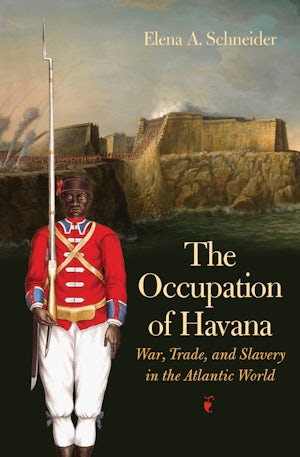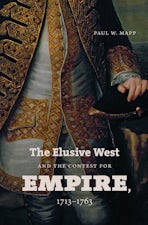The Occupation of Havana
War, Trade, and Slavery in the Atlantic World
By Elena A. Schneider
360 pp., 6.125 x 9.25, 14 color plates., 35 halftones, 8 maps, notes, index
-
Hardcover ISBN: 978-1-4696-4535-3
Published: November 2018 -
Paperback ISBN: 978-1-4696-7252-6
Published: August 2022 -
E-book EPUB ISBN: 978-1-4696-4536-0
Published: October 2018 -
E-book PDF ISBN: 979-8-8908-5693-7
Published: October 2018
Published by the Omohundro Institute of Early American History and Culture and the University of North Carolina Press
Buy this Book
- Hardcover $42.50
- Paperback $29.95
- E-Book $19.99
For Professors:
Free E-Exam Copies
Published by the Omohundro Institute of Early American History and Culture and the University of North Carolina Press
Awards & distinctions
2019 James A. Rawley Prize, American Historical Association
2020 Bryce Wood Book Award, Latin American Studies Association
2019 Murdo MacLeod Prize, Latin American and Caribbean Section, Southern Historical Association
2019 FEEGI Biennial Book Prize, Forum on European Expansion and Global Interaction
Special Mention, 2019 Elsa Goveia Book Prize, Association of Caribbean Historians
The Occupation of Havana offers a nuanced and poignantly human account of the British capture and Spanish recovery of this coveted Caribbean city. The book explores both the interconnected histories of the British and Spanish empires and the crucial role played by free people of color and the enslaved in the creation and defense of Havana. Tragically, these men and women would watch their promise of freedom and greater rights vanish in the face of massive slave importation and increased sugar production upon Cuba's return to Spanish rule. By linking imperial negotiations with events in Cuba and their consequences, Elena Schneider sheds new light on the relationship between slavery and empire at the dawn of the Age of Revolutions.
About the Author
Elena A. Schneider is assistant professor of history at the University of California, Berkeley.
For more information about Elena A. Schneider, visit
the
Author
Page.
Reviews
"The most detailed and analytical account to date of the British siege and occupation of Havana. Engagingly written and lavishly decorated . . . the book will be enlightening and illuminating for undergraduates and required reading for graduate students and specialists in the fields of early American, Caribbean, Atlantic, and imperial history."—Early American Literature
"A rich account of a relatively short military campaign . . . Schneider's reframing of a Spanish defeat provides both a thoughtful account of the crucial history of Cuba within a broader American history and a necessary history of the contributions and lives of African-descended Cubans."—William and Mary Quarterly
"Schneider has synthesized many disparate strands of information and combined them with extensive research, producing a comprehensive analysis of a watershed in eighteenth-century Cuban history. It is a long overdue and welcome addition to the literature."—New West Indian Guide
"The Occupation of Havana is an important work. . . . Schneider writes clearly and well, buttressing all of her arguments with copious notes. . . . Anyone with an interest in Atlantic studies, the Caribbean, slavery, or eighteenth-century naval history will enjoy the read."—Northern Mariner
"Offers a compelling argument. . . . Makes clear that the siege and occupation of Havana was not one but all, the end of an era of rights and privileges for people of African descent, a new dawn for creole oligarchs dreaming of sugar and slaves, and a middle point in an eighteenth century of interimperial conflict and collaboration."—H-Net Reviews
“A bold reinterpretation, rooted in new and exciting findings, of [Havana’s] British occupation in 1762–63 . . . [that] restores Afro-Cuban agency to the island’s history.”—Hispanic American Historical Review




